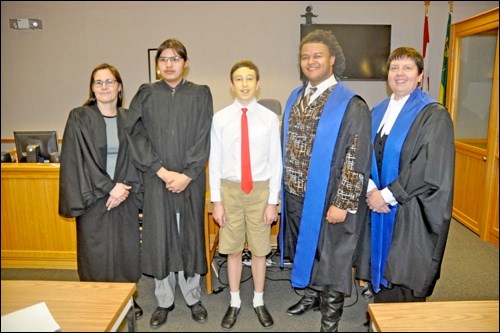One of the most prominent personalities of the Nickelodeon TV network was tried and convicted in North Battleford provincial court Friday.
SpongeBob SquarePants was found guilty of theft under $5000 for stealing a DVD from Walmart in North Battleford.
SquarePants was given a conditional discharge and ordered to apologize and learn the laws and customs of North Battleford.
The ruling came down from Judge Alexander Plummer following SquarePants’ trial in provincial court.
As you probably can tell by now, this was not a real trial.
It was, in fact, the North Battleford High School Mock Trial involving students from John Paul II Collegiate, Sakewew, and the North Battleford Comprohensive High School.
This was part of the national Law Day activities across Canada this month marking the anniversary of the signing of the Charter of Rights and Freedoms.
While Judge Plummer did preside over court that morning, he is actually a Grade 10 student from Sakewew who was one of several student participants. Students also played the roles of Crown and defence counsel, witnesses, court clerk, and of course the accused himself, SpongeBob SquarePants.
The student lawyers were advised by Crown prosecutors Nicole Leinenweber and Charlotte Morden and defence lawyer Rob Feist. Meanwhile, Judge Lorna Dyck was on hand to assist Judge Plummer and provide guidance and knowledge to the students about the procedures seen in court.
This was the first time a student Moot Court had been organized for North Battleford. While the lawyers were active in organizing it, most of the effort came from the students who prepared for their various roles.
“The majority of the work, they did themselves,” said Leinenweber.
Feist credited Judge Dyck with putting a scenario together “that was appropriate for high school students and really gave them a chance to experience what the law and what a real trial process is all about.”
According to the trial scenario that played out in court, Spongebob had been accused by Walmart store manager Barney the Dinosaur of stealing a DVD of Finding Dory.
The defence team argued that SpongeBob did not have the necessary “mens rea” in this case, as he was a sea creature who was not well versed on life in North Battleford, and did not know that you had to pay for things.
While the scenario seems a little outlandish, Judge Dyck explained there are real issues involved for people to consider.
“There are layers to this that can be seen,” Dyck said. One is to show the process of how a trial works, but there is an added layer of showing what is needed to prove a case, including what are the elements of an offence and what is “actus reas” and “mens rea”.
There is also a third layer that Judge Dyck describes as a “deeper sociological and cultural element to this that will get people thinking.”
That is “the idea of outsiders coming in and knowing the laws and what needs to be known and how we would treat outsiders.”
Dante Bacchetto, a Grade 10 student at the NBCHS, portrayed Spongebob in the court scenario. He came away from the experience having learned something new about how courts function.
“It’s interesting to see how the courts work. It’s very different than it is on TV,” he said. “It’s interesting to learn how it actually works and how the witnesses get called, and just the court proceedings in general.”
Bacchetto also said he learned something about the judge’s role in helping rehabilitate the accused.
Plummer said he, too, found it different compared to what he’s seen on TV.
“I’m a big fan of ‘Judge Judy’ so I watch her show a lot,” said Plummer. “And you know what, surprisingly, it’s a lot different from her show. So I’m actually shocked and quite amazed about how the system actually works.”
Plummer said he had learned a lot during his brief time on the bench, and might even be inspired to pursue a legal career himself one day.
“I’m glad I got the opportunity to do it, I learned a lot about what it’s like to sentence somebody. And you know, in some cases you feel bad for them, but you have to do it.”
In all, Judge Dyck was pleased with the enthusiasm shown by the students who had participated that day.
“What had been our hope is that they would learn something about the court process but also have some enjoyment, and I believe that happened.”




